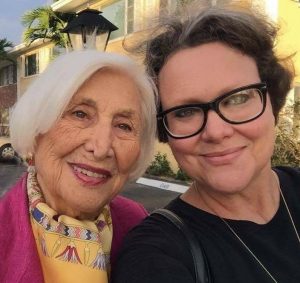
Suzanne Elizabeth Anderson
“That filled a void in my relationship with you, thank you.” My brother, responded to my most recent column about my relationship with Mom with this brief comment that warmed my heart. But my column had also opened an uncomfortable box of memories which I’d become very adept at closing off.
Like Pandora’s box, I wondered what to do with them once they’d been released. I didn’t like what these memories said about me. Somehow, they managed to cloud out all the good I’d done and replace it with a picture of a self-centered, grasping, young woman who often put her own desires ahead of others.
Mom laughed when I described my experience. “Stop the pity party, only you think those things.”
Whether this is true, and I believe the truth lies somewhere in between, I realized forgiveness is difficult to give and especially be received, by ourselves. It is as if we see ourselves in a fun house mirror through the unreliable lens of our faulty, one-sided memories.
Perhaps that is why God created mercy. It doesn’t have to be received because it simply exists. With divine mercy Jesus asks us to respond to his forgiveness and unwarranted mercy by saying, “Jesus, I trust in you.”
We can because God sees what we cannot see in ourselves. Because God created us in his own image, we are beautiful and good and most of all, love. Because Jesus, the Word of God, spoke us into existence, he calls us beloved child, precious and redeemed.
Thomas Merton wrote, “No matter how low you may have fallen in your own esteem, bear in mind that if you delve deeply into yourself you will discover holiness there.” That holiness was placed there by God. Nothing we do will remove it. Our actions may cover it with shame, fear, hate, but when we turn back to God and receive his forgiveness all that offending dirt is wiped away.
In God’s eyes, once we are forgiven, our sin is gone from his memory as ‘far as the east is from the west’. If only we could do the same for ourselves.
Sometimes when I look back, I see wasted years when I pursued careers, people, and things that I now realize were not meant to be mine. And I am filled with regret for those lost years. It seems I hold onto my shame and fear and hate as a talisman. A memory keeper, to remind my how unworthy I am of God’s love, his redemption, his welcoming embrace. And that is exactly the purpose of those self-defeating emotions.
If we can be convinced that God really hasn’t forgiven us, this keeps us from entering God’s embrace. We remain outside of experiencing the healing of God’s love for us.
Mercy is the gift which offers unwarranted forgiveness to clean our wounds and heal them with God’s love. Grace is the comforting balm that soothes our battered hearts.
When we feel the desire to hold onto our shame, fear or hate after we have sought God’s forgiveness, we need to say, “Jesus, I trust in you.” Then let go of the pain and embrace God’s love.
We have not lived perfect lives. Yet everything which has occurred, God has used for our good, to make us stronger, wiser, humbler. We are better now because our eyes are fixed on the one whose love burns away the detritus of our past.
When we allow God to heal us, we extend that healing to others. When we give to someone else out of the goodness we received, our giving is a creative act. We create from something old, something better. This is how God works, this is the resurrection and the life that came after death, this is the love that redeemed sin, and a world filled with hate is born again into love.
Nothing is ever lost when we give it to God.
Dr. Jana Riess & The Twible
Sunday, May 28, 9:30 – 10:15 a.m. at St. John’s Episcopal Church in Breckenridge
Dr. Jana Riess, will address the Sunday Forum at St. John the Baptist Episcopal Church to discuss her book The Twible (2013) in which she retells all 1,189 chapters in the Bible in tweets of 140 characters or less! Dr. Riess is the former Religion Book Editor for Publishers Weekly, is an expert on religion in literature. She’s a blogger and the author of many books, including Flunking Sainthood (2014) and Mormonism for Dummies (2005). Please join us!

